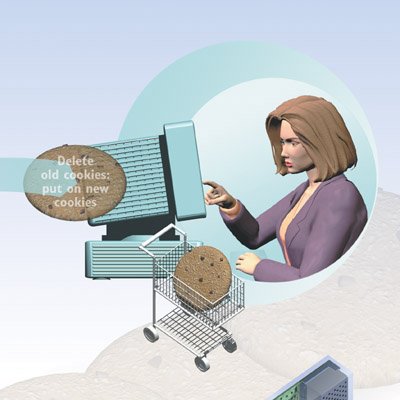Chapter 4. How Websites Invade Your Privacy
| Surfing the Web may feel like a solitary experience, but in fact, every time you visit a new website, that website gathers information about you. The information might be innocuoushow many pages you visit on the site, for example. But it might be not-so innocuous as well. The site may track every page you visit and the amount of time you spend on each page. It might examine your IP address and find out your geographic location and your place of work. And it may gather a lot more information and be able to put together a surprisingly sophisticated and complete profile of who you are and your personal interests. So, how is this done? In some instances, the site may use this information to better deliver information to youit might customize which pages it shows to you, depending on your past surfing habits on the site, for example. The site may customize the ads it delivers to you as well. But it might do more with that information as well, which can be disturbing. It might be able to create a complete profile of you and then sell that information to advertisers, other websites, or the highest bidder. When information like this from a website is combined with offline databases with profiles about you (such as what you've bought at particular stores), an extremely complete profile about you can be built. Three technologies are often used to track your web activitiescookies, web tracking, and web bugs. Cookies are bits of data put on a hard disk when someone visits certain websites. There are legitimate uses for cookiesfor example, they make it easier for people to use websites that require a username and password. The cookie on the hard disk has the username and password on it, so people don't have to log in to every page that requires that information. Instead, the cookie sends the information to the server and the person can visit the page freely. Cookies can contain many kinds of information, such as the last time a person visited the site, the person's favorite sites, and similar information. They can be used to track people as they go through a website and to help gain statistics about which types of pages people like to visit. Although cookies can be used to track how people use a website, many other methods can be used, as well. In one method, web server logs are examined in detail. This would make it possible, for example, to identify the most popular pages on the site, the sites people have just visited, how many pages people read in a typical visit, and similar information. Other methods include using software sniffers that examine every packet coming into or going out of a website. Webmasters can use this tracking information to help create better sitesbut they can also use it to assemble demographic information to sell to advertisers. Web bugs can also trace people's paths through a website. Web bugs get their name not in reference to an error in a program, but instead from the term to bugas in "to wiretap." More dangerously, web bugs can be included in email, and they can actually enable people to view some of your email. |
EAN: 2147483647
Pages: 161
